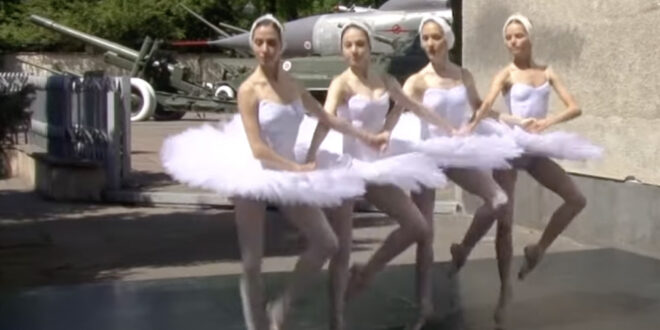COMMENTARY by Susan Katz Keating
Is Vladimir Putin dead? Should we believe the “insider” who announced on Telegram that the Russian president died again, and that a fresh coup is underway in Moscow? Or should we trust the extraordinary denial from Kremlin spokesman Dmitry Peskov that the report is an “absurd information canard,” and Putin is fine?
Here’s how to tell. Get a short wave radio or a good Internet connection, and tune in to Русское Радио (Russian Radio) or Channel 1 television, and listen and watch for Tchaikovsky’s Swan Lake. If the ballet is off the airwaves, Putin likely is alive. If the dancing swans appear on an endless loop, it doesn’t look good for Vladimir Vladimirovich.
The swans would be critical in the wake of an Oct. 26 report on the “General SVR” Telegram channel that the 71-year old Putin died at 20:42 Moscow time, a few days after he allegedly was found convulsing on his bedroom floor. “Now the doctors are blocked in the room with Putin’s corpse,” the post noted, adding that “active negotiations are underway” as part of a coup.
Dramatic stuff, indeed. But what does all this have to do with a ballet about an evil sorcerer and a doomed love affair?
The correlation between Swan Lake and travails inside the Kremlin may seem discordant – like ballerinas performing a pas de quatres in front of an antiaircraft gun – but it has been consistent for more than 40 years.
READ MORE Commentary from Soldier of Fortune publisher Susan Katz Keating
Listeners in the Soviet Union first encountered the connection in 1982. On November 10 of that year, the standard nightly television and radio programs suddenly were replaced by Swan Lake. The ballet was played on a loop for some 27 hours. Then Moscow announced that General Secretary Leonid Brezhnev was dead.
Brezhnev’s successor, Yuri Andropov, died 15 months later, in 1984. Before his death was announced, the airwaves were filled with the sights and sounds of Swan Lake.
The same thing happened in March 1985, when General Secretary Konstantin Chernenko died.
When Swan Lake again dominated the Russian airwaves in December 1991, Soviet leader Mikhail Gorbachev wasn’t dead – but the Soviet Union was in deep trouble.
Soviet lawmaker Sergei Filatov knew instantly what the broadcast meant when he heard it while on vacation on Aug. 19, 1991.
“I turned on the TV and saw the swans dancing,” Filatov told an interviewer. “For five minutes, 10, for an hour. Then I realized that something had happened because we learned to read between the lines in Soviet times.”
Filatov jumped on the next plane to Moscow, where a coup was underway. In December of that year, the USSR collapsed.
Swan Lake premiered in 1877 at the Bolshoi Theatre in Moscow, when Tsar Aleksandr II ruled Russia. At first, it was a ballet based on a folk tale. After 1922, when the Soviet Union came into being, the ballet was staged as an allegory. The plot line of ill-fated love was reworked to symbolize the new Soviet era.
“You would think that the ballet is just a fairy tale,” podcaster Cara Stevens said on an episode of the Russia House program. “But on the Soviet stage with the Soviet ending, and Soviet censors, Swan Lake became an embodiment of communism itself.”
The ballerinas no longer portrayed swans protecting their princess, Stevens said. “They were an army.”
The ballet became a touchstone work of Soviet theatre. It was a source of government pride, and was used as a way to showcase Soviet greatness. National and international leaders alike attended performances in Moscow. Foreigners who saw the ballet included U.S. President Richard Nixon, Cuban dictator Fidel Castro, Yugoslavia’s Josip Broz Tito, and the Shah of Iran.
More recently, the ballet has been used as a taunt; a way to poke a stick at the Russian bear.
When Russia seized Crimea from Ukraine in 2014, a quartet of defiant ballerinas sent a message to Putin that only a former Soviet would understand.
Four costumed cygnets appeared outside a military history museum in Odesa. Against a backdrop of military equipment, the cygnets danced the familiar pas de quatres from Swan Lake.
A master of ceremonies, Oleksiy Honcharenko, explained the performance.
“For millions of Soviet people, a televised performance of Swan Lake signaled a change in the country’s leadership — either the death of the Secretary-General, or his ouster as a result of a coup,” Honcharenko said. “Because Vladimir Putin has made a fatal mistake by unleashing aggression against Ukraine, today Odesa, as a cultural capital, performs for him this portentous work.”
Shortly after Russian forces invaded Ukraine in 2022, the Kyiv Grand Ballet performed Swan Lake on tour in France. The troupe concluded its final performance on stage by singing Ukraine’s national anthem.
“It was patriotic, and it sent a message,” recalls Irish tourist Breda Morrison, who saw the performance. “You had to know the context. Taken along with Swan Lake, the message was, let this be the end of Vladimir Putin.”
When an independent Russian news outlet, TV Rain, shut down in 2022, the station signed off with a dig at the Kremlin. The final broadcast was Swan Lake.
That’s it. @tvrain is gone. What were the final images the famed TV station chose to broadcast? There was only ever one option, of course. pic.twitter.com/mpEZuJqCAB
— Kevin Rothrock (@KevinRothrock) March 3, 2022
While some may have wished for Putin to be ousted, others have taken the leap to reporting his demise as fact. The “General SVR” Telegram channel launched its latest round of death knells on Monday, when it claimed that Putin suffered a heart attack and had to be resuscitated.
The post described the supposed incident in dramatic detail.
“…members of the security service, who were on duty at the residence, heard noise and sounds of falling coming from the president’s bedroom,” the post noted. “Two security officers immediately followed into the president’s bedroom and saw Putin lying on the floor next to the bed and a table with food and drinks overturned.”
The post continued: “Putin convulsively arched while lying on the floor, rolling his eyes. The doctors who were on duty at the residence… performed resuscitation, having previously determined that the president was in cardiac arrest…”
The channel on Thursday announced that Putin had died.
“Now the doctors are blocked in the room with Putin’s corpse,” the post noted, adding that “active negotiations are underway” as part of a coup.
The British media in particular quickly picked up on the Telegram posts. So, too, did the Kremlin.
Putin’s spokesman Dmitry Peskov took his case to state media outlet RIA Novosti.
“These [kinds of stories] belong to the category of fake news, discussed with enviable tenacity by a number of media outlets,” Peskov said. “This brings nothing but a smile inside the Kremlin.”
Would that be a smile of derision; or one of glee among plotters? What is the truth? Is a coup underway in Moscow? Is Putin firmly in charge? Is he dead? Sick? Or is he healthy?
The Kremlin did not immediately return a request for comment from Soldier of Fortune.
Russia-watchers should monitor all the signs.
Moscow so far has not broadcast Swan Lake on a loop. This means the status quo most likely remains intact. But keep the short wave radios handy. If you hear those familiar strains from Tchaikovsky, all bets are off.
Susan Katz Keating is the publisher and editor in chief of Soldier of Fortune.
 Soldier of Fortune Magazine The Journal of Professional Adventurers
Soldier of Fortune Magazine The Journal of Professional Adventurers






